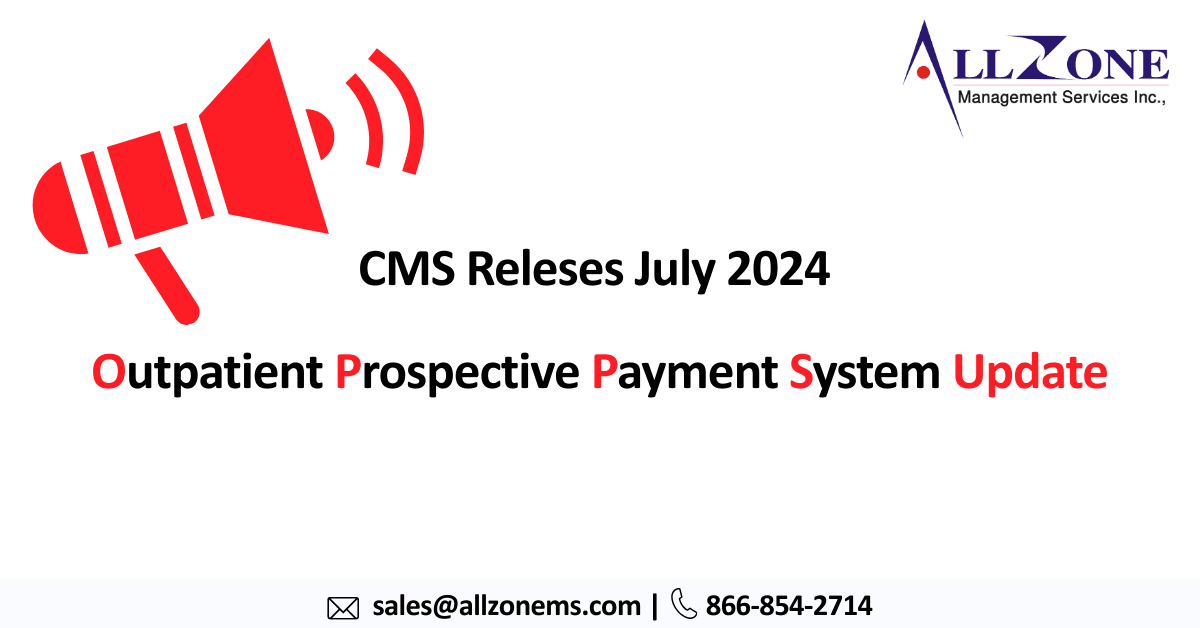The CMS Releases July 2024 OPPS Update (reference: CMS Change Request CR13632, MLN Matters number MM13632). Here’s a summary of key changes:
- New Coverage for COVID-19 Pre-Exposure Prophylaxis:
-
- Drug: PEMGARDA (pemivibart) – Code: Q0224 (Note: This code is not reimbursed under OPPS, but at a “reasonable cost”)
- Administration: Code: M0224 (Covered: Receives separate payment under OPPS)
- Category: New Technology (APC 1506, Level 6) with reimbursement range of $401-$500.
- Important: No patient cost-sharing applies for either code.
-
Additional Information:
- The update also includes 26 new codes for proprietary laboratory tests.
- For full details, refer to CMS Change Request CR13632.
Additional Highlights of the July 2024 OPPS Update (CR13632)
This update includes several other important changes for billing:
- New Lab Tests: 26 new Proprietary Laboratory Analyses codes have been added (codes 0450U-0475U).
- New Pass-Through Devices: Two devices received approval for pass-through status under OPPS:
- C1605: Leadless dual-chamber pacemaker (implantable)
- C1606: Single-use adapter for ultrasound on upper GI endoscopes
- Device Clarifications:
- C1601 (single-use pulmonary endoscope) excludes reprocessed devices.
- C1602 (antimicrobial bone void filler) effective date clarified as January 1st.
- Device Offset Updates:
-
- The device offset for 0505T (when billed with C1604) is now $0 (effective January 1st, see transmittal 12421 or CR13488).
- Pass-through status for C1761 (coronary lithotripsy catheter) expires June 30th.
- New CPT® Category III Codes: 34 new codes were released in January and are effective July 1st.
- Status Indicator Change:
- 0621T (laser trabeculostomy) status changes to “J1” (paid under OPPS through APC 5492), effective January 1st.
- New HCPCS Code:
- C9901 (endoscopic GI tract defect closure) with status “J1” (paid under OPPS through APC 5362), effective January 1st.
Drug and Biological in July 2024 OPPS update (CR13632):
New Codes and Payment:
- 6 new HCPCS codes for drugs/biologicals added. These are assigned status “G” (pass-through with separate APC payment).
- J7353 (Anacaulase-bcdb gel): Status changed to “G” (pass-through with APC payment).
Ending Pass-Through Status:
- Pass-through status is ending for 11 HCPCS codes on June 30th.
New and Deleted Codes:
- 49 new drug/biological/radiopharmaceutical codes added.
- Deleted codes effective July 1st:
- J2780 – Injection, ranitidine hydrochloride;
- J9371 – Injection, vincristine sulfate liposome;
- Q4210 – Axolotl graft or axolotl dual graft; and
- Q4277 – Woundplus membrane or e-graft.
Status Indicator Changes Delayed:
- 9 HCPCS codes have status indicator changes. Due to issues, these will be published in October’s I/OCE (retroactive to July 1st).
New Skin Substitutes:
- 23 new HCPCS codes for skin substitutes are effective July 1st.
Chargemaster Maintenance:
- Reviewing July 2024 OPPS updates (like this one) is crucial for chargemaster coordinators. This helps identify:
- New services to add
- Code changes
- Code deletions
- Discuss these updates with relevant departments to ensure accurate billing for devices, drugs, and services.
- A well-maintained chargemaster reduces claim denials.
Allzone’s Medical Coding Solutions for Healthcare Providers
Medical coding solutions address the accurate translation of medical services into standardized codes for insurance billing. Medical coding solutions can encompass various tools and services depending on the specific needs of a healthcare provider.
Here’s a breakdown of some key areas medical coding solutions can address:
- Outsourced Coding: Hiring a medical coding company like as Allzone’s to handle all or part of your coding needs.
- Temporary Staffing: Bringing in certified coders to address backlogs or staff shortages.
- Specialty Coding: Expertise in specific areas like cardiology, oncology, or surgery.
- Revenue Cycle Management: Services encompassing coding, billing, and claims management.
- Coding Compliance Audits: Regular reviews to ensure coding accuracy and identify areas for improvement.
Coding Software and Automation:
- Electronic Health Record (EHR) Integration: Automating code assignment based on physician documentation within the EHR.
- Coding Compliance Software: Tools to ensure code accuracy and adherence to latest guidelines (ICD-10, HCPCS).
- Audit and Review Tools: Software to identify potential coding errors and optimize reimbursement.

